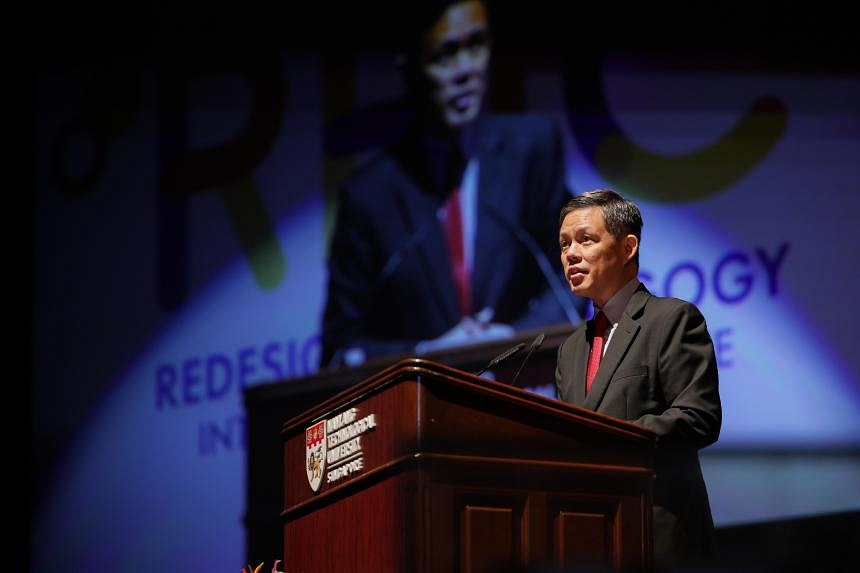from straitstimes.com:
Teachers must be committed to lifelong learning to inspire next generation: Chan Chun Sing
Teachers committed to lifelong learning will be equipped to tackle changes that arise as technology and society evolve, said Education Minister Chan Chun Sing. ST PHOTO: GIN TAY
Gabrielle Chan
UPDATED
MAY 29, 2024, 10:46 AM
FacebookTelegram
SINGAPORE - To get young people committed to lifelong learning, teachers have to become lifelong learners themselves, said Education Minister Chan Chun Sing.
In this way, teachers will be equipped to tackle changes that arise as technology and society evolve, including changing teaching methods and the need to develop students in a well-rounded manner.
Mr Chan was speaking on May 28 at the Redesigning Pedagogy International Conference, where more than 800 delegates from 22 countries, including Singapore, will exchange research findings, ideas and teaching experiences.
Hosted by the National Institute of Education, Nanyang Technological University, the annual conference runs till May 30 and aims to foster collaboration among educators, researchers and policymakers worldwide.
In his speech, Mr Chan spoke of how education can transform to adapt to technological advancements and the changing role of teachers as technology is integrated into learning.
One major challenge is personalising and customising each student’s learning journey on a mass scale, he said, in view of evolving expectations of education where more personalised outcomes and relevant skills are demanded.
He highlighted the difficulties of achieving “quality at scale, proliferation with speed and affordability in cost” simultaneously, adding: “It used to be said you can achieve two out of three at best, but seldom all three together.”
But with the challenges also come opportunities, which means the time has come when teachers stand the “best chance to do this well”, Mr Chan said.
“I think we have in our hands now the technology, data and collective experiences of our teaching fraternity to give this our best shot.”
Such changes also mean that teachers need to reassess how education is delivered and what counts as success in education, he said. He added that education must be about developing skills and attitudes for lifelong learning and connecting across differences.
He listed several ways in which new teaching methods and practices have entered the classroom, such as the use of education technology that has changed the way teachers conduct lessons and adapt teaching approaches.
For one thing, new teaching methods have emerged that leverage the science of learning, such as neuroimaging that observes how learners’ brains develop, to enable personalised approaches for learners of all ages.
He cited the Short Answer Feedback Assistant and MathsCheck tools, used by students in schools, that utilise generative artificial intelligence to provide tailored feedback and customise tests based on students’ abilities.
But a teacher’s judgment has to be “the first and last mile to bridge what technology provides us and what our students need”.
“These tools will not replace our teachers,” said Mr Chan.
“As we incorporate more technology in teaching, the greater the judgment required by our teachers on when to use, for what to use, for who to use and how much to use.”
He also spoke of developing students holistically, beyond just content knowledge. In such situations, a teacher’s role is to be more of a “facilitator for discovery” rather than just a provider of information.
“We must support students in developing empathy, perspective-taking and relational skills to work collaboratively and harmoniously across diverse groups,” Mr Chan said, encouraging teachers to find new ways to help students acquire these skills.
It is also important to develop skills such as critical thinking and social-emotional foundations, he said, adding that teachers need to provide new perspectives to students.
“As our students transition from school into subsequent stages of their lives, learning should not, and must not, cease,” he said.
These changes require teachers to obtain new skills, he said, not just in the latest best teaching practices, but also in partnering with parents, industry and the community.
“All these must stem from a commitment to lifelong learning by our teachers first,” said Mr Chan.
Teachers must be both “scientists and artists”, using data and technology, and combining these tools to bring out the best in each child, he said.
Doing so may not have been possible before due to constraints of resources and time, he said. “But today, with the technology, data and experiences, we have the best chance to do this well, and we must have the urgency to do it fast.
“This will be the true mark of our professionalism to inspire and engender deep respect.”

 : Rajeev Variyar Photography]
: Rajeev Variyar Photography]
































































